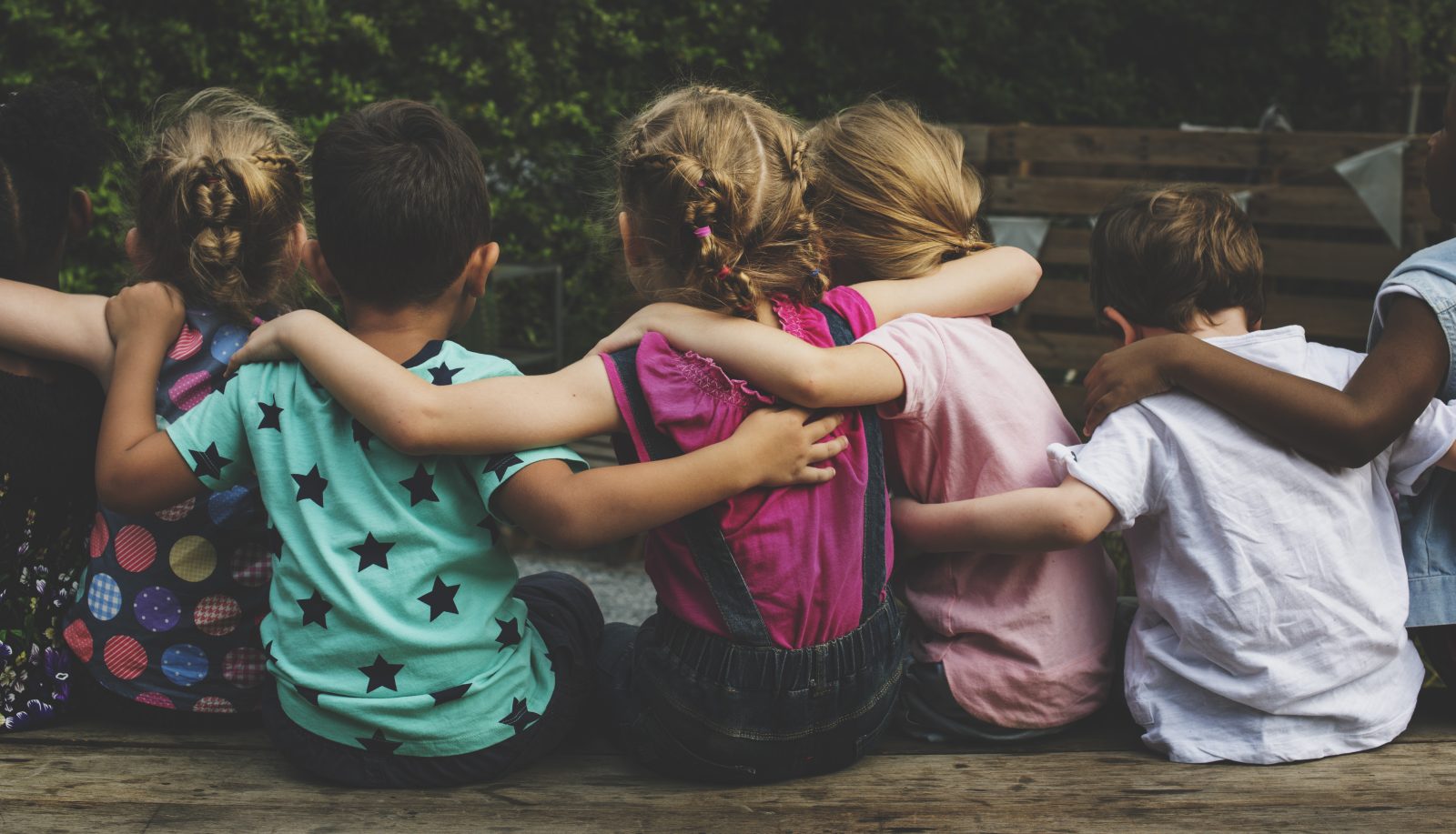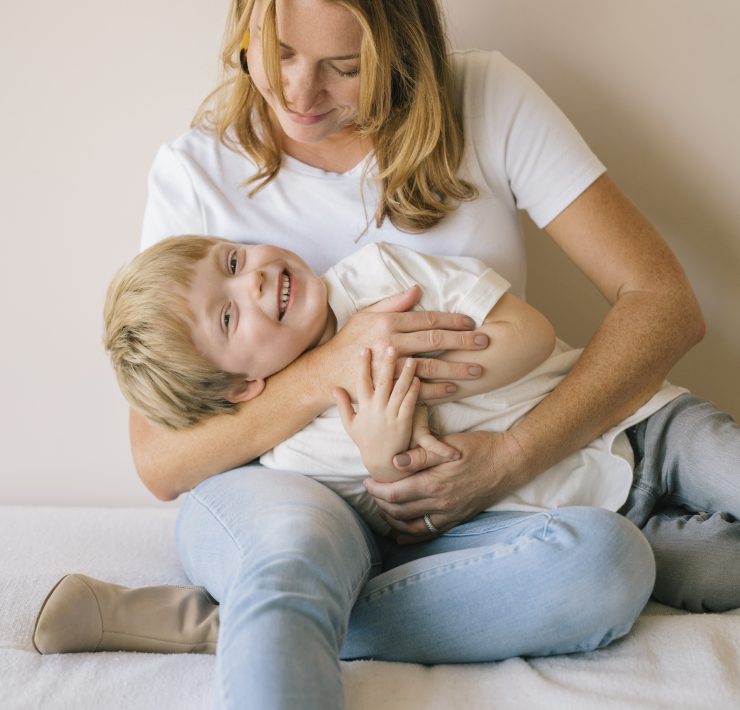
“Do not even consider foster care if you’re doing it for yourself or trying to fill a void in your life. You cannot advocate honestly for a child when all you really want is to keep them.”
Amanda and her husband Brad* adopted five biological siblings from foster care — ages 11, 10, 9, 7 and 6. Today on Raise, Amanda shares her journey from fostering to adoption, the importance of supporting biological parents, and her advice for those considering foster care.
On Her Introduction to Foster Care
My little sister had a group of four best friends and one of them was in foster care. That introduced me to the concept, and then my husband and I served with Big Brothers and Big Sisters, and it was our experience there that made us realize there was such a need for foster families.
We never intended to adopt through foster care. Our goal was to serve as foster parents for two or three years and then start our own biological family. Our oldest three were 5, 4 and 3 when they were placed with us, and our hope was that they would be reunified with their biological family, but that ended up not being the case. They were with us for two and half years before their younger siblings were also placed with us. Even at that point, our goal was still reunification.
On The Importance Of Training And Community
We were really fortunate that we went to a church where the idea of foster care was stirring in several hearts, all at the same time. We ended up doing the classes and certification together and then experiencing foster care life together. We also happened to move into a neighborhood where there are several other foster families.
The agency we worked with provided training, which was extremely important. You often paint a picture for yourself of what it’s going to look like, but it’s far more intense when you’re living it. In class, we heard the craziest stories and thought, “We can handle that,” but we were thinking in terms of one event. One time. We didn’t realize we could be dealing with situations like that every day for three months. It’s hard to prepare for how dark it can get, and how exhausting. We’ve had some very dark periods, and we would have been in a lot of trouble if we hadn’t had the training, but the kids are doing awesome now ,and we love them dearly and can’t imagine life without them.
On Transitioning From Foster Care to Adoption
Our oldest three were our first placement. I was nervous about going from zero to three, but we were passionate about keeping siblings together, and it was only supposed to be a 90 day placement. The plan was for them to eventually be transferred to an out-of-state family member. So we thought, “We can do this. We don’t have other children, and it’s only for 90 days. We can do anything for 90 days!” Look at us now.
Shortly after the youngest siblings joined us, it became clear that our situation with the older three was moving toward adoption, but the process was very long — three years.
On Post Placement Care
Our state provides insurance and therapies throughout a child’s foster care placement, adoption, and into their adulthood, should they wish to take advantage of it. Prior to placement, it’s impossible to know exactly what a child has endured. Once our children were placed with us, we took time to assess their needs and quickly realized Brad and I needed more trauma training.
We also needed to establish routines to help our children understand that adults are responsible and safe and to assure them they were not going to be abandoned. They needed clearly defined boundaries and a super regimented schedule to help them feel secure. Even now, years later, it’s still important to them. Every once in a while, we’ll start to loosen up and it will start to affect them, so we’ll tighten the reins and you can almost see them take deep breaths as if, “Oh, now I can relax.” I don’t think I can paint a picture of the relief that they feel to know that we are in control.
On Advice For Those Considering Foster Care
Do not even consider foster care if you’re doing it for yourself or trying to fill a void in your life. You cannot advocate honestly for a child when all you really want is to keep them.
One of the things said to me all the time is, “Oh, I could never do that. I could never raise a child and then have to give it back.” But at the end of the day, you have to ask yourself what’s more important: being a safe place, a loving home for a child that really needs one, or protecting your own heart? What you’ve done for that child and what they’ve meant to you during their placement is worth a lot. It doesn’t have to be permanent to be significant.
Even though we’ve adopted our children, our hope is to reunify them in a sense through an adoption that is as open as possible. Their biological mom may not mother them, but we hope she can be a positive person in their life.
Also, a support system is essential. And talking to someone who has first-hand experience with fostering.
On Honoring Birth Families
My children know that I am not their birth mom, and deep inside of them, they have a connection to their biological family. If you tell a child they came from a bad place or from bad people, it makes them feel like they are bad. I want them to know and believe in their core that they are good. I make it a point to say, “I love mommy K, and I’m so proud of her. She’s doing well and you should be proud of her too. She’s been working hard to do well in her life so that you can see how great she’s doing.” And every single time I say that to them, they get big smiles on their faces. I know deep, deep inside that that’s part of their self-confidence – that the person they came from is doing great in life. It’s huge.
*Names have been changed to protect the identity of the family.
Jessica Butler is the co-founder of Raise, stepmother of two, and adoptive mother of one. Prior to Raise, she was a writer on USA’s "In Plain Sight" and TNT’s "The Last Ship." She and her husband, writer/producer Warren Bell, co-created the Nick at Nite series "Instant Mom," based on her life as a stepmother. She lives in Los Angeles with her husband and six-year-old son, Levon.


